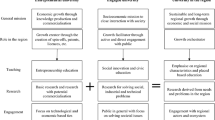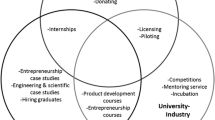Abstract
University start-ups are, in the Organisation for Economic Co-operation and Development (OECD) and European Union (EU) policy setting, viewed as important means to transform scientific advances into innovations, corresponding both to market and societal needs (Mowery & Sampat, 2005; Rider, Hasselberg, & Waluszewski, 2013). The high expectations on the ability to directly transform social and material resources, valuable in an academic research setting, into new products/services to contribute possible value in a business setting are rooted in the so-called 1990s science and innovation policy doctrine, with the OECD as its most prominent advocate (Eklund, 2007; Waluszewski, 2011). The doctrine points to university research as an important but underutilised direct source of innovation for growth and societal welfare. In the wake of this policy regime, a number of measures have been undertaken to stimulate the commercialisation of research results, with the establishment of university start-ups as a key measure.
Access this chapter
Tax calculation will be finalised at checkout
Purchases are for personal use only
Similar content being viewed by others
Notes
- 1.
This question relates to the disputed question on how the focus in commercialisation affects the content and direction of research, discussed in Rider et al. (2013).
References
Aaboen, L., Dubois, A., & Lind, F. (2013). Strategizing as networking for new ventures. Industrial Marketing Management, 47, 1033–1041.
Aaboen, L, Laage-Hellman, J., Lind, F., Öberg, C. & Shih, T. (2016). Exploring the role of university spin-off in business networks. Industrial Marketing Management. doi:10.1016/j.indmarman.2016.03.008.
Baraldi, E., & Waluszewski, A. (2011). “Betting on science or muddling through the network”: Two universities and one innovation commission. The IMP Journal, 5, 172–192.
Bercovitz, J., & Feldman, M. (2006). Entrepreneurial universities and technology transfer: A conceptual framework for understanding knowledge-based economic development. Journal of Technology Transfer, 31, 175–188.
Chapple, W., Lockett, A., Siegel, D., & Wright, M. (2005). Assessing the relative performance of U.K. university technology transfer offices: Parametric and non-parametric evidence. Research Policy, 34, 369–384.
Clarysse, B., Wright, M., & Van de Velde, E. (2011). Entrepreneurial origin, technological knowledge and the growth of spin-off companies. Journal of Management Studies, 48, 1420–1442.
Damsgaard, E., & Thursby, M. (2013). University entrepreneurship and professor privilege. Industrial and Corporate Change, 22, 183–218.
Di Gregorio, D., & Shane, S. (2003). Why do some universities generate more start-ups than others? Research Policy, 32, 209–227.
Dubois, A., & Gadde, L.-E. (2002). Systematic combining: An abductive approach to case research. Journal of Business Research, 55, 553–560.
Eklund, M. (2007). Adoption of the innovation system concept in Sweden. Dissertation, Uppsala University, Uppsala, Sweden.
Ensley, M., & Hmieleski, K. (2005). A comparative study of new venture top management team composition, dynamics and performance between university-based and independent start-ups. Research Policy, 34, 1091–1105.
Etzkowitz, H., Webster, A., Gebhardt, C., & Terra, B. (2000). The future of the university and the university of the future: Evolution of ivory tower to entrepreneurial paradigm. Research Policy, 29, 313–330.
Håkansson, H. (Ed.). (1982). International marketing and purchasing of industrial goods—An interaction approach. Chichester: IMP Project Group, John Wiley & Sons.
Håkansson, H., Ford, D., Gadde, L.-E., Snehota, I., & Waluszewski, I. (2009). Business in networks. London: Wiley.
Håkansson, H., & Snehota, I. (1995). Developing relationships in business networks. London: Routledge.
Håkansson, H., & Waluszewski, A. (Eds.). (2007). Knowledge and innovation in business and industry. The importance of using others. London: Routledge.
Huber, G. P., & Power, D. J. (1985). Retrospective reports of strategic-level managers: Guidelines for increasing their accuracy. Strategic Management Journal, 6, 171–180.
Kaufmann, A., & Tödtling, F. (2002). How effective is innovation support for SMEs? An analysis of the region of upper Austria. Technovation, 22, 147–159.
Kneller, R. (2007). The beginning of university entrepreneurship in Japan: TLOs and bioventures lead the way. Journal of Technology Transfer, 32, 435–456.
Landry, R., Amara, A., & Rherrad, I. (2006). Why are some university researchers more likely to create spin-offs than others? Evidence from Canadian universities. Research Policy, 35, 1599–1615.
La Rocca, A., Ford, D., & Snehota, I. (2013). Initial relationship development in new business ventures. Industrial Marketing Management, 42, 1025–1032.
La Rocca, A., & Snehota, I. (2014). Relating in business networks: Innovation in practice. Industrial Marketing Management, 43, 441–447.
McKelvey, M., & Holmén, M. (2009). Learning to compete in European universities: From social institution to knowledge business. Cheltenham: Edward Elgar Publishers.
Mirowski, P. (2011). Science mart. Privatizing American science. Cambridge, MA: Harvard University Press.
Montesinos, P., Carot, J., Martinez, J., & Mora, F. (2008). Third mission ranking for world class universities: Beyond teaching and research. Higher Education in Europe, 33, 259–271.
Mowery, D., & Sampat, B. (2005). The Bayh-Dole Act of 1980 and university–industry technology transfer: A model for other OECD governments? Journal of Technology Transfer, 30, 115–127.
Öberg, C., & Shih, T. (2014). Divergent and convergent logic of firms: Barriers and enablers for development and commercialisation of innovations. Industrial Marketing Management, 43, 419–428.
Perna, A., Baraldi, E., & Waluszewski, A. (2015). Is the value created necessarily associated with money? On the connections between an innovation process and its monetary dimension: The case of Solibro’s thin-film solar cells. Industrial Marketing Management, 46, 108–121.
Persson, G. & Pagrotsky, L. (2004). Forskning för ett bättre liv. Government bill proposal 2004/05:80. Submitted to the Swedish parliament.
Penrose, E. T. (1959). The Theory of the Growth of the Firm. John Wiley: New York.
Pisano, G. (2006). Science business: The promise, the reality and the future of biotech. Boston: Harvard Business School Press.
Ragin, C. C., & Becker, H. S. (Eds.). (1992). What is a case? Exploring the foundations of social inquiry. Cambridge: Cambridge University Press.
Rider, S., Hasselberg, Y., & Waluszewski, A. (Eds.). (2013). Transformations in research, higher education and the academic market. The breakdown of scientific thought. Dordrecht: Springer Science and Business Media.
Rider, S., & Waluszewski, A. (2015). Crowding out knowledge: Efficiency, innovation and higher education. In M. Peters, J. Paraskeva, & T. Besley (Eds.), The global financial crisis and educational restructuring (pp. 235–248). New York: Peter Lang Publishing Group.
Rothaermel, F. T., & Thursby, M. (2005). Incubator firm failure or graduation?: The role of university linkages. Research Policy, 34, 1076–1090.
Shane, S. (2004). Academic entrepreneurship—University spinoffs and wealth creation. In S. Venkataraman (Ed.), New horizons in entrepreneurship. Cheltenham: Edward Elgar Publishing.
Shih, T. (2016). Marketing for start-ups. In Torgal, F.P. (Eds.), Startup creation for the smart eco-efficient built environment. Oxford: Elsevier.
Snehota, I. (2011). New business formation in networks. IMP Journal, 5, 1–8.
Strömsten, T., & Waluszewski, A. (2012). Governance and resource interaction in networks. The role of venture capital in a biotech start-up. Journal of Business Research, 65, 232–244.
Walsh, J., Baba, Y., Goto, B., & Yasaki, Y. (2008). Promoting university–industry linkages in Japan: Faculty responses to a changing policy environment. Prometheus, 26, 39–54.
Waluszewski, A. (2011). The policy practitioners dilemma. The national policy and the transnational networks. Stockholm: Vinnova report 2011:07.
Author information
Authors and Affiliations
Editor information
Editors and Affiliations
Copyright information
© 2017 The Author(s)
About this chapter
Cite this chapter
Shih, T., Waluszewski, A. (2017). 9 The Challenging Life of University Start Ups: The Different View of Value Creation in a Policy Setting Compared to a Business Setting. In: Aaboen, L., La Rocca, A., Lind, F., Perna, A., Shih, T. (eds) Starting Up in Business Networks. Palgrave Macmillan, London. https://doi.org/10.1057/978-1-137-52719-6_10
Download citation
DOI: https://doi.org/10.1057/978-1-137-52719-6_10
Published:
Publisher Name: Palgrave Macmillan, London
Print ISBN: 978-1-137-52714-1
Online ISBN: 978-1-137-52719-6
eBook Packages: Business and ManagementBusiness and Management (R0)




